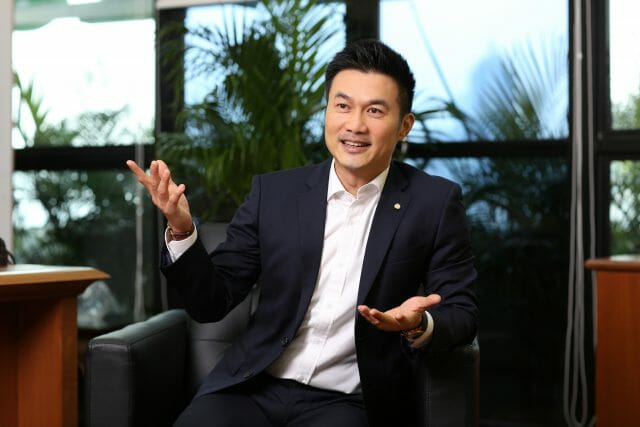By Sharon Chang
Apart from government bodies and healthcare establishments — in unprecedented circumstances such as the outbreak of the Covid-19 pandemic involving collapse of businesses, loss of lives and jobs — people are looking to insurance firms for support.
Until a vaccine is found, the ongoing crisis does not have a fixed timeline. Besides from the millions of fatalities caused, the outbreak has led to severe economic impacts, causing major challenges to the global supply chain and business sectors such as airlines, tourism, and hospitality.
Our central bank has responded by cutting interest rates and expanding its quantitative easing programme to make more liquidity available to borrowers in retail and small and medium enterprise (SME) segments.
A crisis of this scale affects all business sectors – but it especially puts tremendous pressure on insurers who can expect to be inundated with inquiries and claims across multiple different policies, such as health, life, or non-life coverage.
Insurance companies play a pivotal role during times of economic stress by helping companies and households manage risks and cushion losses. Yet, as one of the biggest groups of investors, they are also vulnerable to volatility in financial markets.
So, how is the insurance industry likely to shape up to the unfolding crisis?
Business Today speaks to Raymond Lew, Chief Executive Officer (CEO) and President of Sun Life Malaysia on the implicating pressures insurance organisations face during Covid-19, as since the outbreak, brokers and insurers alike have felt the impacts on their businesses and the industry at large.
“There is no doubt the pandemic and subsequent Movement Control Order (MCO) significantly impacted all businesses and the economy,” Lew says, adding that it will be a challenging time for all and the insurance sector is no exception to it.
The rate at which the virus had spread was alarming and will continue to have lasting effects on the nation and the rakyat.
Despite these uncertain times, Lew is adamant that Sun Life Malaysia (SLM), is well positioned to respond with due diligence.
“We are well positioned to help and support Malaysians through our best of breed life insurance and Family Takaful solutions,” Lew says. He adds that there is an opportunity for them to reach out to a broader segment of Malaysians with suitable and affordable solutions for all their needs.
Although, the company faced minor disruptions to their business operations, supply chain, postponement of key campaigns and on-the-ground events, however, through SLM’s robust business continuity procedures, they have been operating optimally since the MCO was enforced.
“The company prides itself on its core business purpose of empowering Malaysians to achieve lifetime financial security and to live healthier lifestyles,” Lew emphasises.
“We understand this is not quite ‘business as usual’ as we enter into a new normal era, but the company is well positioned as we have been conducting numerous virtual trainings to our bank partner’s sales team and Agency force to maintain Client engagement and support.”
One of the biggest challenges is transitioning workplaces to a remote environment, and Lew points out that with the introduction of strict social distancing laws and employees working from home, a balance between flexibility and reliability is paramount.
In a response to a question, Lew believes that communication with Clients is crucial in times of crisis. “They need to be able to contact us easily to carry out their business since face-to-face contact is abandoned,” he states.
SLM has accelerated the digitisation of their business to ensure that their Clients can continue to contact the company for any enquiries and requests.
At the same time, the insurance provider has established a Non-Face-to-Face sales process to allow continuous sales by their sales intermediaries during the MCO period.
“We believe that our long-term digitalisation plans have been the key towards delivering superior services to our Clients,” Lew asserts.
Through the company’s strong drive in encouraging Clients to utilise digital means as way of communication, SLM saw a 200 percent increase in sign-ups on their Client portal, SunAccess.
A safety net and measures during trying times
Understandably many Malaysians will cut their non-priority policies during this current situation due to job losses or pay cuts, but Lew argues, that instead of cancelling the policies, the pandemic should be a clear reminder that such policies can provide a safety net when needed.
“As health and safety of our Clients is SLM’s top priority, we have adapted our initiatives to fit their current financial scenario in which they can apply to defer their premium/contribution payments for 3 months,” Lew says.
Besides, Lew also shares that their comprehensive range of products are well-suited for different life stages, financial affordability, and goals.
Meanwhile, SLM is constantly innovating behind the scenes to develop more flexible and personalised plans to suit the needs of all Malaysians, and one such plan is the GOLIFE, the first microinsurance plan in Malaysia.
Since it was launched, GOLIFE has touched 55,000 lives, Lew exclaims, as it is designed to help people get protected for as little as RM5 per month via their smartphone.
Additionally, SLM is participating in the RM8 million Covid-19 Test Fund, an initiative to support the Ministry of Health’s efforts to conduct more testing in the country. Qualified individuals who have been referred by registered doctors, to undergo the test at private labs will be reimbursed up to RM300.
Covid-19 a game-changer
Businesses will have to face the reality to pivot ahead, Lew points out, and now is the time to regroup, rethink strategies and re-innovate ways to reach out to the consumers.
“From SLM’s perspective, the company sees market opportunities in the significantly underpenetrated Takaful sector, which Lew says the penetration rate is currently at 15.2 percent.
“This is a market with strong growth potential in the M40 and B40 segments,” he asserts.
Lew believes, in order to reach that market, technology can be a growth catalyst for the industry to align with the new normal by providing protection and services at lower cost and this is where micro-insurance policies will play a pivotal role in this current climate.
Nevertheless, he says they are committed to work with the industry to ensure the sector continues to grow as it remains a rapidly growing market with huge upside driven by stable domestic consumptions and increasing consumer awareness.
Whilst Lew expects demand for protection to increase in the wake of this outbreak, they will continue to optimise their distribution channels and products for this market segment.
“It is important to position ourselves and customise our products to the needs, accessibility and affordability of our Clients,” Lew concludes.










